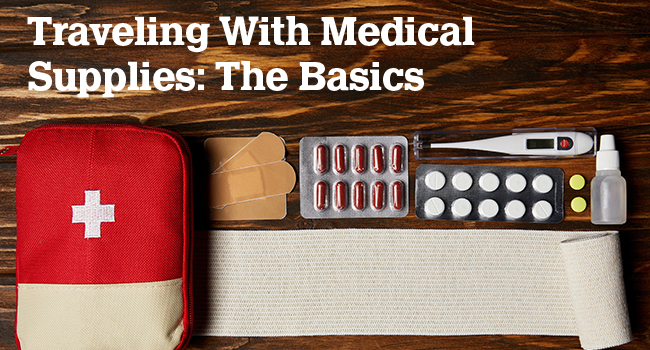There is so much to pack for a trip, yet so little luggage space! For those with medical needs, meeting the airline’s suitcase weight requirement is not the only worry.
Getting yourself through airport security is a feat in itself, more so for those with special medical needs. Everything, including diabetes supplies, canes and wheelchairs, external devices and medications must undergo screening by the Transportation Security Administration (TSA). First, notify the TSA officer of your condition, your ability to walk/stand and what supplies/ devices you are transporting. According to the International Air Transport Association (IATA), everything should be professionally packed and labeled, and you should travel with documented proof of your medical needs. External devices that are attached to the body such as feeding tubes or insulin pumps will also be screened via X-ray if they can be safely disconnected. Otherwise, alternative screening methods will be used. Be sure to consult with your doctor and the device manufacturer to determine if the device can safely pass through image scanning.
Medications, both prescription and over-the- counter (OTC), require special preparation. Keep medications in your carry-on so that you have them in the case of lost luggage. Always keep medicines in their original packaging/container, clearly labeled your full name (passport name if traveling internationally), doctor’s name, dosage and name of medication (generic and brand name). Carry copies of all prescriptions along with a note from the doctor, translated for the countries where you will be visiting. Bring enough medication to last your entire trip and a little extra in case of delays,but check requirements first, as many countries will only allow you to bring a 30-day supply. Medication restrictions vary among countries. It is extremely important to check with the foreign embassy of the country you will be visiting if your medications are permitted in that country. The Center for Disease Control and Prevention (CDC), warns that even traveling with certain common domestic medications can result in serious consequences. OTC allergy medications, asthma inhalers, and a number of prescription medications are deemed unlicensed or illegal in some countries. The rules vary drastically among countries and violations can result in extreme penalties including imprisonment. Research the rules on all medications, both prescription and OTC, that you will be taking abroad.
Traveling by sea can be easy with a little planning. Upon booking, advise the cruise line of all medical needs. The cruise line can assist with distilled water and extension cords for Continuous Positive Airway Pressure (CPAP) machines, sharps disposal, coolers for temperature-controlled medication and more. Accessible cabins have mobility features and door widths to accommodate wheelchairs/scooters. Mobility devices including canes, walkers, wheelchairs and scooters must be stored in your cabin when not in use and cannot be left in the hallway. When ships do not dock at a pier, they anchor offshore and transport guests to the island by small boats; these tenders may not accommodate guests in scooters, and wheelchairs should be collapsible.
Many trains have accessible seating and restrooms. Check with the rail line regarding wheelchair/scooter sizes, as you’ll need to ensure yours meets their specifications. For example, Amtrak can accommodate both manual and powered wheeled mobility devices under 30 inches wide, 48 inches long, have a ground clearance over 2 inches and that weigh less than 600 pounds.
Whether you travel by air, sea or rail, check with your travel provider to ensure your oxygen and dialysis equipment meet their specifications and to make proper storage arrangements. Before you pack anything, always consult your doctor to ensure you are healthy enough for travel.
• Portable/travel CPAP machine
• Lightweight walker/wheelchair
FOR MORE INFORMATION:
Can I fly with this? Send a question to AskTSA on Facebook Messenger or Twitter
TSA Notification Card: www.tsa.gov/sites/default/files/disability_notification_card_508.pdf
What does the CDC say about where I’m going? www.cdc.gov/travel
Rent wheelchairs, scooters, oxygen and other special needs equipment: www.specialneedsatsea.com

